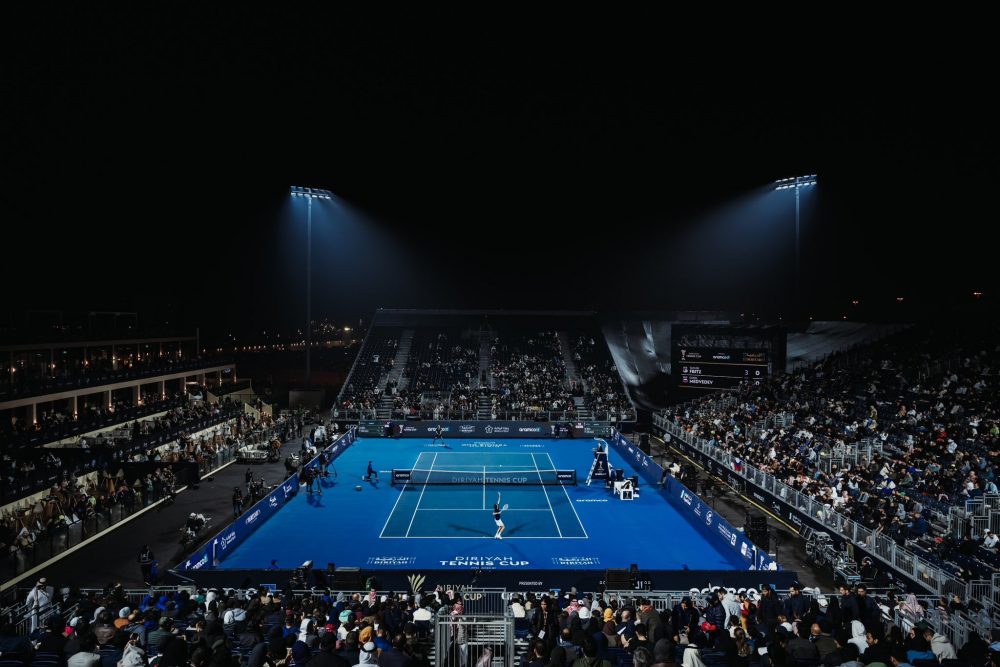The head of the Professional Tennis Players Association (PTPA) has warned against using players as ‘morality police’ when it comes to the divisive subject of hosting Tour events in Saudi Arabia.
In recent months the Middle Eastern nation has slowly started to venture into the tennis market. Saudi Arabia has been named as the new host of the ATP Next Gen Finals which features the eight highest-ranked players under the age of 21. The event will be held at the King Abdullah Sports City in Jeddah at the end of next month. Ubitennis also understands that the WTA Finals will be moving to the country in 2024 as part of a multi-year deal. Talks about the exact venue are currently ongoing.
The president of the Italian Tennis Federation, Angelo Binagi, has also claimed that there will be a Masters 1000 event in the country in 2025. However, Ubitennis has not been able to confirm this with their sources.
Saudi Arabia is rapidly expanding their sports portfolio via its Private Investment Fund which has a value of more than £500bn, according to the BBC. However, the country has been accused of using sports to improve its reputation which has been affected by wrongdoing. A term which is better known as sportswashing.
“They are investing colossal amounts of money in entertainment and sporting events to launder its image and portray itself as a “reformist” and “progressive” state. Major sporting events in Saudi Arabia should be seen in this context- as more potential sportswashing,” Amnesty International’s regional campaigner Reina Wehbi told Ubitennis earlier this year.
“These expensive public relations schemes help Saudi Arabia turn the focus away from its appalling human rights record and avoid scrutiny for its continuous human rights violations.”
The situation is causing a dilemma for tennis officials who are warming to the idea of establishing partnerships with Saudi Arabia amid concerns over their human rights records. One issue relates to LGBT rights with the women’s Tour having openly gay players such as Daria Kasatkina. Same-sex relationships are not codified under Saudi law but they are prohibited under Islamic Law which the government uses for a lot of their legal framework. Officials have previously claimed that gay athletes and tourists are welcome to the country as long as they respect their culture.
As for the role the PTPA plays in this debate, CEO Ahmad Nassar has said that all players should be allowed to voice their opinions on the matter and choose if they want to play in Saudi Arabia or not. Although he sees no reason why events can’t be held in the region, providing an appropriate agreement is established.
“The PTPA, like other players associations, exists to represent all players. That includes players with various viewpoints on nuanced and complicated issues such as holding events in Saudi Arabia (or any other location). Players must remain free to play – or not play – wherever their own personal beliefs dictate.” Nassar told Ubitennis.
“Like all businesses, tennis must be careful who it partners with. It’s certainly possible to host events in almost any location, provided the business terms, optics, and ability to drive meaningful and lasting improvements are considered. But putting the burden on professional athletes to belatedly act as the world’s “morality police” is at best curious and hypocritical, and at worst, a dangerous and purposeful misdirection.”
Nassar has previously worked in the legal sector and was a lecturer in sports law at Georgetown University before switching his focus to the sports business. During his time as a lecturer, he was also president of the NFL Players Inc.
The PTPA chief refers to an article published by The Economist which he says summarizes the current situation with Saudi Arabia ‘well.’ One extract reads “The West trades widely with Saudi Arabia, the deals will not make its bad human-rights record worse, and it is not clear that the country could or would monopolise and destroy any global sport.” The piece also talks about the need for sports to be open to new capital and fresh ideas.
Justifying that doing deals with Saudi Arabia will not make their questionable human rights record any worse will raise the eyebrows of some. Nevertheless, the PTPA appears to be in favour of entering the market.
“As the advocacy group for professional tennis players, the PTPA encourages players to use their voices, platforms and influence to speak out on issues that are important to them,” Nassar points out.
“Our role as an organization, as indicated in our PTPA Principles, is to ensure players’ freedom of expression and freedom of opportunity are protected regardless of their personal beliefs.”
Note: this is the second part of Ubitennis’ interview with Nassar. The first part discussed the possible impact of a tennis merger and can be read HERE.






